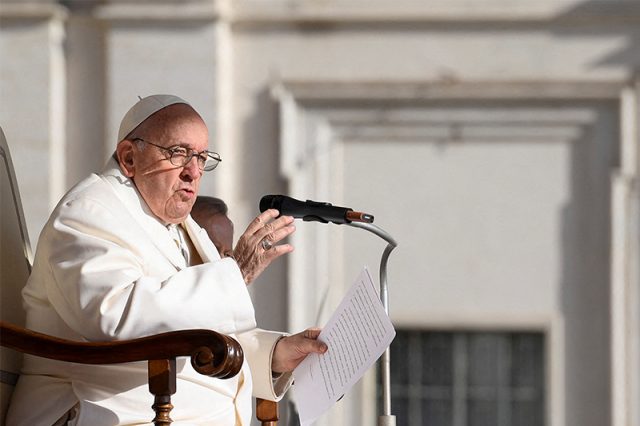
ROME— Pope Francis has commended the “little greatness” of St. Thérèse of Lisieux in a new message focusing on the 19th-century Carmelite’s relevance for the Church today.
St. Thérèse’s “genius consists in leading us to what is central, essential and indispensable,” the pope wrote in an apostolic letter published Oct. 15.
The young saint, whose life and writings focused on love and following a “little way” of holiness, “shows that, while it is true that all the Church’s teachings and rules have their importance, their value, their clarity, some are more urgent and more foundational for the Christian life,” he said.
“From heaven to earth, the timely witness of Saint Therese of the Child Jesus and the Holy Face endures in all the grandeur of her little way,” Francis wrote.
The pope’s latest in-depth reflection on a saint takes its title, “C’est la Confiance,” or “It is Trust,” from a quotation in one of Thérèse’s letters: “It is trust and nothing but trust that must lead us to Love.”
St. Thérèse of Lisieux, also called St. Thérèse of the Child Jesus and the Holy Face or “The Little Flower,” was a French Carmelite nun who died in 1897 from tuberculosis at the age of 24.
One of the Catholic Church’s most beloved saints, in 1997 she was proclaimed a Doctor of the Church, an honor to this day granted to only 37 saints.
In her autobiography “Story of a Soul,” St. Thérèse recounted her “little way” of holiness and her desire to spend heaven “doing good on earth.” She is a patron saint of missionaries and her liturgical feast is Oct. 1.
“A century and a half after her birth, Therese is more alive than ever in the pilgrim Church, in the heart of God’s people,” the pope wrote.
“She accompanies us on our pilgrim way, doing good on earth, as she had so greatly desired,” he continued. “The most lovely signs of her spiritual vitality are the innumerable ‘roses’ that Therese continues to strew: the graces God grants us through her loving intercession in order to sustain us on our journey through life.”
“Dear Saint Therese, the Church needs to radiate the brightness, the fragrance and the joy of the Gospel,” he wrote. “Send us your roses!”
The pope’s letter on St. Thérèse is punctuated by frequent citations of the saint’s own words as written in letters and in her autobiography “Story of a Soul.”
Though 2023 marks 150 years since Thérèse’s birth and 100 years since her beatification, the message was published on the liturgical feast of the Spanish mystic St. Teresa of Ávila.
Pope Francis said he did not want to publish a letter about St. Thérèse of Lisieux on one of her own anniversaries because the significance of her message goes beyond these dates.
“Its publication on the liturgical Memorial of Saint Teresa of Avila is a way of presenting Saint Therese of the Child Jesus and the Holy Face as the mature fruit of the reform of the Carmel and of the spirituality of the great Spanish saint,” he wrote.
“From Saint Teresa of Avila, Therese inherited a great love for the Church and was able to plumb the depths of this mystery,” he wrote.
Pope Francis said St. Thérèse also invites us to greater missionary outreach.
About her missionary focus, despite being a cloistered nun from the age of 15 until her death at 24, Francis said, “she wrote that she entered Carmel ‘to save souls.’”
“In a word, she did not view her consecration to God apart from the pursuit of the good of her brothers and sisters,” the pope wrote. “She shared the merciful love of the Father for his sinful son and the love of the Good Shepherd for the sheep who were lost, astray and wounded. For this reason, Therese is the Patroness of the missions and a model of evangelization.”
The pope also recalled St. Thérèse’s “spiritual closeness” with a man who was on death row for committing a triple homicide.
Before she entered the Carmelite monastery, Thérèse offered Mass for this man, Henri Pranzini, and prayed for his salvation. Though the murderer showed no signs of being repentant, the girl had total faith that God would forgive him.
“This intense experience of hoping against all hope proved fundamental for her,” Francis wrote, quoting St. Thérèse’s’s own writing: “After this unique grace, my desire to save souls grows each day.”
Thérèse understood sin in the context of the mystery of Christ, he wrote. “The sin of the world is great but not infinite, whereas the merciful love of the Redeemer is indeed infinite.”
Trust in God
The Holy Father pointed out the young saint’s total trust in God and his love, which led her to emphasize the primacy of divine action.
Her “‘little way,’ the path of trust and love,” is one of her most important discoveries, the pope said. “Everyone can follow this way, whatever their age or state in life.”
“In place of a Pelagian notion of holiness, individualistic and elitist, more ascetic than mystical, that primarily emphasizes human effort, Therese always stresses the primacy of God’s work, his gift of grace,” he wrote.
He said the trust of St. Thérèse can apply to our whole lives, “where we are often assailed by fears, the desire for human security, the need to have everything under control.”
“Here we see the importance of her invitation to a holy ‘abandonment,’” he wrote.
The message also recalled the great trial of faith the saint experienced during the last year and a half of her life, starting with the first symptoms of tuberculosis, the illness that would eventually take her life at the age of 24.
“Her account reveals the heroic nature of her faith, her triumph in spiritual combat with the most powerful temptations,” he wrote. “She felt herself a sister to atheists, seated with them at table, like Jesus who sat with sinners. She interceded for them, ever renewing her own act of faith, in constant loving communion with the Lord.”
“Even in her darkness, she experienced the complete trust of a child that finds refuge, unafraid, in the embrace of its father and mother.”
Lessons for the Church
Pope Francis’ letter also emphasized the Carmelite saint’s humility and her spiritual revelation that her “vocation is Love.”
“This heart was not that of a triumphalistic Church, but of a loving, humble and merciful Church,” he wrote. “Therese never set herself above others, but took the lowest place together with the Son of God, who for our sake became a slave and humbled himself, becoming obedient, even to death on a cross”
“This discovery of the heart of the Church is also a great source of light for us today,” the pope said. “It preserves us from being scandalized by the limitations and weaknesses of the ecclesiastical institution with its shadows and sins, and enables us to enter into the Church’s ‘heart burning with love’, which burst into flame at Pentecost thanks to the gift of the Holy Spirit.”
“It is that heart,” he continued, “whose fire is rekindled with each of our acts of charity. ‘I shall be love.’ This was the radical option of Therese, her definitive synthesis and her deepest spiritual identity.”
Pointing out the saint’s enduring relevance, Francis wrote that “in an age that urges us to focus on ourselves and our own interests, Therese shows us the beauty of making our lives a gift. At a time when the most superficial needs and desires are glorified, she testifies to the radicalism of the Gospel. In an age of individualism, she makes us discover the value of a love that becomes intercession for others.”
“At a time when human beings are obsessed with grandeur and new forms of power, she points out to us the little way,” he continued. “In an age that casts aside so many of our brothers and sisters, she teaches us the beauty of concern and responsibility for one another.”
“At a time of great complexity, she can help us rediscover the importance of simplicity, the absolute primacy of love, trust and abandonment, and thus move beyond a legalistic or moralistic mindset that would fill the Christian life with rules and regulations, and cause the joy of the Gospel to grow cold.”









